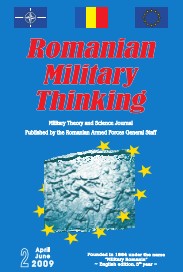THE EVOLUTION OF THE NORTH ATLANTIC ALLIANCE STRATEGY
THE EVOLUTION OF THE NORTH ATLANTIC ALLIANCE STRATEGY
Author(s): Niculae ValsanContributor(s): Iulia NASTASIE (Translator)
Subject(s): International relations/trade, Security and defense, Military policy, Political behavior, Peace and Conflict Studies
Published by: Centrul tehnic-editorial al armatei
Keywords: non-state actors; concerted military actions; climate change; peacekeeping; political intimidation;
Summary/Abstract: Terrorism and organised crime are among the most important challenges nations are confronted with in the 21st century. These two phenomena have been acknowledged in the post-Cold War security environment as potential sources of risk and threats to the stability and security of nations and as an obstacle in the development of some liberal, open and democratic societies, governed based on the principles of the rule of law. NATO’s strategic concept that was adopted during the 1999 Washington Summit refers to these two phenomena as being risks that might affect the Alliance’s interests in the field of security. In this context, the author points out a few aspects regarding the consequences of terrorism, the danger of the use or the random use of violence, mainly against civilians, in order to force or intimidate policy-makers or societies with a view to achieving terrorist objectives.
Journal: Romanian Military Thinking
- Issue Year: 2009
- Issue No: 2
- Page Range: 40-49
- Page Count: 10
- Language: English

